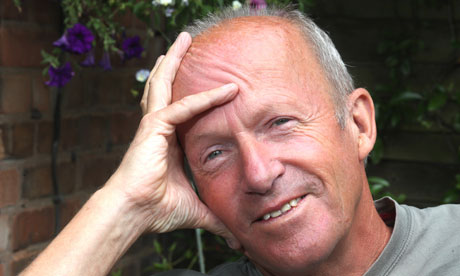Jim Crace: 'At the Watford Gap it hit me that the English landscape was absolutely drenched in narrative'

'Who knows, there might be other books that might get written' … Jim Crace. Photograph: Eamonn McCabe for the Guardian
The sources of inspiration behind Jim Crace's novels are often far removed from the final form of his books. Close observation of the decline of the Midlands car industry eventually resulted in The Gift of Stones, a novel set at the dawn of the bronze age. A visit to a care-in-the-community hostel near his Moseley home came to fruition in Quarantine, his 1997 Booker shortlisted account of Jesus's 40 days in the wilderness. But even Crace was a little surprised that passing the "apparently unpromising location" of the Watford Gap service station should have provided the impetus for a novel set during the enclosure of the English countryside.
Harvest is set in an unnamed English village, an indeterminate number of centuries ago, at the moment when peasant farmers were forced off the land to make room for sheep. It's Crace's 11th novel and has been longlisted for this year's Man Booker prize. But, he explains, it only exists because of the failure of another project that at one time looked likely to end his career and led him to announce that would be his last novel. Despite his books earning a consistent stream of awards, critical praise and healthy sales, there have always been areas of his work with which he was dissatisfied. A lifelong socialist and activist, he has long expressed regret that his novels aren't more directly political. "I know my 17-year-old self would read my bourgeois fiction, full of metaphors and rhythmic prose, with a sinking heart."
He also wanted to write more autobiographically. "It isn't only narcissistic. There is also something courageous and generous in writing about your alcoholism or your failed relationships. I felt that in some ways my novels lacked heart because of the distance between me and the subject matter. But no one wants to read a book based on good health, a happy upbringing, a long marriage. 'Happiness writes white', as they say. I also loved my parents – another thing that you can't write autobiographically about – but because I loved them so much I thought I could write about losing them."
The book was called Archipelago and was difficult from the beginning. "But when you start a novel it is always like pushing a boulder uphill. Then, after a while, to mangle the metaphor, the boulder fills with helium and becomes a balloon that carries you the rest of the way to the top. You just have to hold your nerve and trust to narrative. It's been with us for thousands of years and has conferred all sorts of advantages, which is why, in Darwinian terms, it has survived."
Except, this time, narrative didn't come to his aid. Crace began to dread waking up in the mornings, knowing he'd have to go to his study. "I not only felt that I'd lost my mojo. I felt I'd been deluding myself about the power of narrative, a belief that I had maintained throughout my career. I just wanted out as soon as it was finished."
It never was finished. After 40,000 words he abandoned the project, and was left with a sense of "90% deep anxiety, strangely overshadowed by 10% of relief". And the very day after he decided to quit, the benign forces of narrative returned to reveal themselves at the Watford Gap. "I've been past it so often, but this time I noticed that the surrounding fields were full of ridge and furrow. As a Midlander and a big walker I'd always loved ridge and furrow fields, the plough-marked land as it was when it was enclosed. It is the landscape giving you a story of lives that ended with the arrival of sheep."
More
Harvest is set in an unnamed English village, an indeterminate number of centuries ago, at the moment when peasant farmers were forced off the land to make room for sheep. It's Crace's 11th novel and has been longlisted for this year's Man Booker prize. But, he explains, it only exists because of the failure of another project that at one time looked likely to end his career and led him to announce that would be his last novel. Despite his books earning a consistent stream of awards, critical praise and healthy sales, there have always been areas of his work with which he was dissatisfied. A lifelong socialist and activist, he has long expressed regret that his novels aren't more directly political. "I know my 17-year-old self would read my bourgeois fiction, full of metaphors and rhythmic prose, with a sinking heart."
He also wanted to write more autobiographically. "It isn't only narcissistic. There is also something courageous and generous in writing about your alcoholism or your failed relationships. I felt that in some ways my novels lacked heart because of the distance between me and the subject matter. But no one wants to read a book based on good health, a happy upbringing, a long marriage. 'Happiness writes white', as they say. I also loved my parents – another thing that you can't write autobiographically about – but because I loved them so much I thought I could write about losing them."
The book was called Archipelago and was difficult from the beginning. "But when you start a novel it is always like pushing a boulder uphill. Then, after a while, to mangle the metaphor, the boulder fills with helium and becomes a balloon that carries you the rest of the way to the top. You just have to hold your nerve and trust to narrative. It's been with us for thousands of years and has conferred all sorts of advantages, which is why, in Darwinian terms, it has survived."
Except, this time, narrative didn't come to his aid. Crace began to dread waking up in the mornings, knowing he'd have to go to his study. "I not only felt that I'd lost my mojo. I felt I'd been deluding myself about the power of narrative, a belief that I had maintained throughout my career. I just wanted out as soon as it was finished."
It never was finished. After 40,000 words he abandoned the project, and was left with a sense of "90% deep anxiety, strangely overshadowed by 10% of relief". And the very day after he decided to quit, the benign forces of narrative returned to reveal themselves at the Watford Gap. "I've been past it so often, but this time I noticed that the surrounding fields were full of ridge and furrow. As a Midlander and a big walker I'd always loved ridge and furrow fields, the plough-marked land as it was when it was enclosed. It is the landscape giving you a story of lives that ended with the arrival of sheep."
More

No comments:
Post a Comment